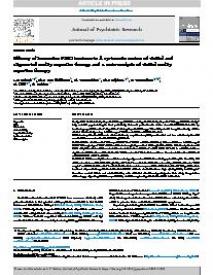Efficacy of immersive PTSD treatments : A systematic review of virtual and augmented reality exposure therapy and a meta-analysis of virtual reality exposure therapy
Background: Virtual reality exposure therapy (VRET) and augmented reality exposure therapy (ARET) are digitally assisted psychotherapies that potentially enhance posttraumatic stress disorder (PTSD) treatment by increasing a patient’s sense of presence during exposure therapy. This study aimed to systematically review
current evidence regarding the efficacy of VRET and ARET as PTSD treatment.
Methods: A systematic electronic database search, a systematic quality assessment and two meta-analyses were conducted in accordance with PRISMA guidelines.
Results: Eleven studies on the efficacy of VRET for PTSD (n = 438) were found, but no studies on the efficacy of ARET. The majority of VRET studies were of a low quality and had heterogeneous results. Meta-analyses showed VRET outperformed waitlist control (standardized mean difference - 0.64 (95% CI -1.05 to - 0.22)) while no significant difference was found between VRET and active treatment conditions (standardized mean difference - 0.25 (95% CI - 0.77 to 0.27)).
Conclusion: VRET was superior to waitlist control groups and as effective as other psychotherapies. However, the results showed considerable heterogeneity due to the low number of studies and variety of VRET methods. VRET may be an effective alternative to current treatments and shows promise for the treatment of PTSD patients that have not responded to previous treatment. Future research should focus on high quality RCTs, including information on side effects and adverse events, with sufficient numbers of participants. This study recognizes a research gap regarding the efficacy of ARET, while it may have potential for PTSD treatment.
Highlights
• Virtual/Augmented reality exposure therapy (V/ARET) may enhance PTSD treatment.
• VRET outperformed waitlist control and matched other active psychotherapies.
• The quality of studies on VRET for PTSD was often low, but seems to be improving.
• No clinical trials studied the efficacy of ARET as PTSD therapy.
• Future research should focus on high quality RCTs on efficacy of VRET and ARET.
Geachte bezoeker,
De informatie die u nu opvraagt, kan door psychotraumanet niet aan u worden getoond. Dit kan verschillende redenen hebben,
waarvan (bescherming van het) auteursrecht de meeste voorkomende is. Wanneer het mogelijk is om u door te verwijzen naar de bron
van deze informatie, dan ziet u hier onder een link naar die plek.
Als er geen link staat, kunt u contact opnemen met de bibliotheek,
die u verder op weg kan helpen.
Met vriendelijke groet,
Het psychotraumanet-team.
In: Journal of Psychiatric Research ; ISSN : 0022-3956 | 143 | november | 516-527
https://doi.org/10.1016/j.jpsychires.2020.11.030


